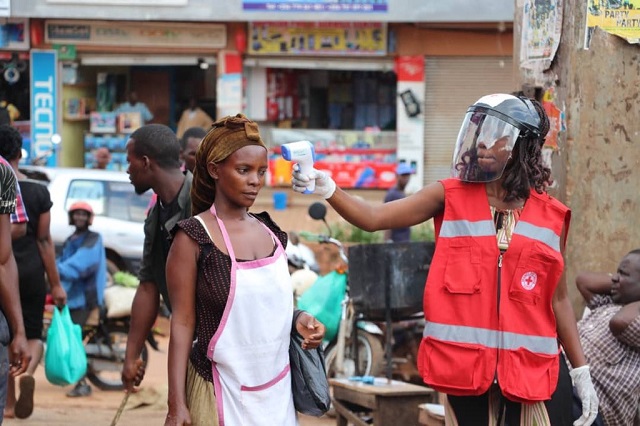
As COVID-19 impacts reach everywhere in the country, low- and middle-income earning youth are racing to respond to this massive and fast-moving challenge. In this article, Musinguzi Laban assess the pandemic’s economic impacts on Uganda’s Youth.
OPINION | LABAN MUSINGUZI | The economic impact of the COVID-19 crisis are increasingly hitting low- and middle-income earners and the poor. International travel restrictions and the full or partial closure of businesses and industries in the country have led to a collapse in global travel and are expected to reduce the flows of remittances. Remittances and other various modes of businesses are important sources of employment and incomes for the poor, respectively. This post assesses the potential impacts of the expected reductions in these income flows by using Ugandan youth as a case study.
The pandemic is likely to have a significant economic toll. For each month that the COVID‑19 crisis persists, the simulations using IFPRI’s Social Accounting Matrix (SAM) multiplier model for Uganda suggest national GDP could fall by between 0.7% and 0.8%. Household incomes are likely to fall, particularly among the poor.
Uganda has a majority and rising youth population in an emerging economy. Even though several reforms and initiatives like Youth Livelihood Program, Skilling the youth through the Business Technical Vocational Education and Training (BTVET) curriculum remain to be completed, we wish to have reform programs like Youth Social Protection initiative launched in Uganda. This can help us achieve economic growth of over 5% in the next years. With continued efforts aimed at improving Uganda’s business climate which is expected to be the leading sector as private sector growth and economic diversification in 2020 and beyond.
This progress will almost certainly be interrupted by the COVID‑19 pandemic. While the government is taking actions to contain the spread of the virus—including the suspension of commercial national and international passenger movements, school and sports clubs closures and a nationwide nighttime curfew,—and the number of reported infections in Uganda is currently low compared to that of many other countries, the global economic slowdown is expected to have major knock-on effects for Uganda. International travel restrictions are already curtailing tourism to the country. The global slowdown is likely reducing payments and remittances received from Ugandan youth working abroad. These sources together account for a percentage of Uganda’ GDP. Thus, any disruptions to these foreign income sources will have far-reaching implications for Uganda’s economy and population.
Using the SAM multiplier model for Uganda, there is simulation that the individual and combined effects of a collapse in the various sectors and reductions in monthly revenues collections and in foreign remittances under more and less pessimistic scenarios. SAM multiplier models are well suited to measuring short-term direct and indirect impacts of unanticipated, rapid-onset demand- or supply-side economic shocks such as those caused by the COVID-19 pandemic. We model the demand shocks as the anticipated reductions in various sectors and remittances revenues.
Let us break down the estimated losses in GDP, which may hit 0.8% per month in the more pessimistic scenario. Lower tourist spending is not only affecting hotels, restaurants, taxi enterprises, tourist guides and mostly the people working here are youth, but also food processing and agriculture. Lower public revenues from URA are likely to affect the government budget. Lower remittances income will likely reduce household consumption of consumer goods and hit sectors producing intermediate goods. We estimate that the absence of tourists alone may cause monthly losses of around UGX 26.3 billion. Thus, the loss in tourism revenues accounts for about two thirds of the total estimated impact.
While all households are hurt by lower tourist expenditures and the drop in doing business in Uganda, it is the poor households and especially those in rural areas that suffer the most from lower remittances. Due principally to the relatively greater decline in remittances that they experience, rural poor households are estimated to lose in total between UGX 22,000 and 29,600 ($6.60-$8.20) per person per month, or between 11.5% and 14.4% of their average income, while urban poor households will see their incomes decline somewhat less, between UGX 18,500 and 22,200 ($5-$6) per person a month, or between 9.7% and 11.5% of their average income.
Policy considerations
If the crisis persists for three to six months, as many now believe likely, the cumulative loss from these three external shocks alone could amount to between 2.1% and 4.8% of GDP in 2020. Importantly, our simulations measure only the effects that might result from specific impact channels, e.g., foreign sources of remittances and revenues. Domestically, restrictions on movement of people within the country and on certain productive activities may also have adverse economic impacts. On the other hand, some sectors may benefit, such as information and communications technologies, food delivery, or the health-related goods and services sectors.
The authorities have begun a course of decisive action to curb the virus outbreak by allocating UGX 284billion and have enacted tax breaks for industrial and various businesses, emphasis on access of electricity and water to industries, factories and households, having discussions with commercial banks on revision of loan interest rates, and is considering providing grants to private businesses through Uganda Development Bank. Additional measures may also be in the works, such as distribution of food and materials to poor households, increasing unemployment benefits, and providing targeted support to specific sectors.
While the country’s focus currently is rightly on fighting the health crisis and mitigating its immediate impacts, planning on how to re-open the economy should start now. To emerge stronger after the COVID-19 crisis, both the public and private sectors should continue to strengthen their collaboration. The government should work to further improve the business climate for the private sector and continue undertaking serious reforms to overcome institutional weaknesses. The crisis may also provide an opportunity to strengthen analytical capacity in Uganda to provide policy makers with research-based solutions for safeguarding Uganda’s economy during future pandemics and other crises.
However according to the UN SDGs 2019 report, this confirms that social protection systems fall short of reaching the most vulnerable groups i.e Youth and Children yet these protection programmes reduce the brunt of poverty and can also prevent people from falling into poverty in the first place. By helping to prevent and ease poverty and inequality at every stage of people’s lives, such programmes make societies more inclusive and stable.
Unless the Government of Uganda takes decisive action, in the case of Uganda’s youth, their poverty levels are likely to increase since we are in a country in which tourism and remittances play a large role. It is also a strong reminder of the interconnectedness of the world and the importance of global cooperation to end this crisis and to be better prepared for the future.
*****
 Musinguzi Laban Joshua is a Communications strategist, Founder and Team Leader at The Smart Life Experiences Initiative, based in Kampala.
Musinguzi Laban Joshua is a Communications strategist, Founder and Team Leader at The Smart Life Experiences Initiative, based in Kampala.
 The Independent Uganda: You get the Truth we Pay the Price
The Independent Uganda: You get the Truth we Pay the Price




This awesome!.. grateful for sharing amidst this challenging situation. Thanks